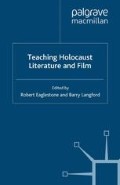Abstract
At the University of the West of England in Bristol I taught for three years, two of these with my colleague Victoria Stewart, a year-long Level 3 optional module entitled “Representing the Holocaust” within the School of English and Drama. What follows is a reflection on some of the issues that arose during the planning, teaching, and evaluation of this course: I do not claim to have found answers to all of these complex questions, but hope to offer some ways of addressing them with students.
Access this chapter
Tax calculation will be finalised at checkout
Purchases are for personal use only
Preview
Unable to display preview. Download preview PDF.
Works cited
Adorno, Theodor (1962/1978) “Commitment”, in Andrew Arato and Eike Gebhardt (eds), The Essential Frankfurt School Reader (New York: Urizen Books).
Adorno, Theodor. (1973) “After Auschwitz”, in Negative Dialectics, trans. E. B. Ashton (New York: Continuum).
Antelme, Robert (1992) The Human Race, trans. Jeffrey Haight and Annie Mahler (Marlboro, VT: Marlboro Press), first published in French as L’espece humaine (Editions Gallimard, 1957).
Bernard-Donals, Michael, and Glejzer, Richard (eds) (2003) Witnessing the Disaster: Essays on Representation and the Holocaust (University of Wisconsin Press).
Horowitz, Sara (1997) Voicing the Void: Muteness and Memory in Holocaust Fiction (State University of New York Press).
Lyotard, J.-F. (1988) Heidegger and “the jews”, trans. Andreas Michael and Mark S. Roberts (Minneapolis: University of Minnesota Press), p. 16.
Sebald, W. G. (2001) Austerlitz, trans. Anthea Bell (London: Hamish Hamilton).
Wilkomirski, Binjamin (1996) Fragments: Memories of a Childhood, 1939–1948, trans. Carol Brown Janeway (London: Picador), first published in 1995 by Judisher Verlag im Suhrkamp Verlag, Frankfurt am Main.
Editor information
Editors and Affiliations
Copyright information
© 2008 Nicola King
About this chapter
Cite this chapter
King, N. (2008). Teaching Holocaust Literature: Issues of Representation. In: Eaglestone, R., Langford, B. (eds) Teaching Holocaust Literature and Film. Teaching the New English. Palgrave Macmillan, London. https://doi.org/10.1057/9780230591806_5
Download citation
DOI: https://doi.org/10.1057/9780230591806_5
Publisher Name: Palgrave Macmillan, London
Print ISBN: 978-0-230-01937-9
Online ISBN: 978-0-230-59180-6
eBook Packages: Palgrave Literature & Performing Arts CollectionLiterature, Cultural and Media Studies (R0)

